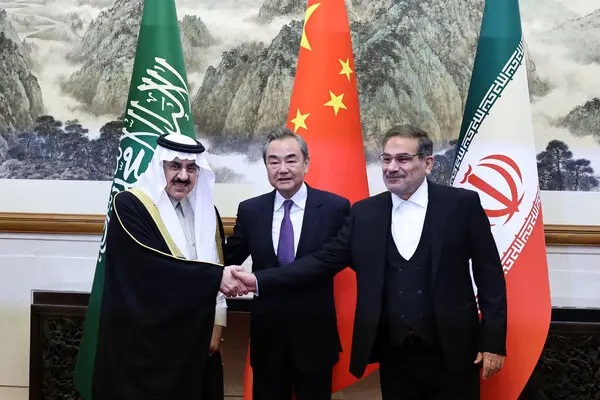
Last week’s deal between Iran and Saudi Arabia brokered by China is a significant success for Beijing, and it could as well change the shape of the Middle East.
Still, it’s not clear in which direction it could spin. It may bring benefits to everybody, or it might also increase conflict in the region.
The first proof of the pudding will be in Yemen. Some 24 hours after the deal, the two local factions fighting a proxy war in the southwestern tip of the Arabian Peninsula agreed to a comprehensive exchange of prisoners. It came after a cease-fire held since October.
In Yemen, the Saudis support the Sunni original Sanaa government, recognized by the United Nations, while the Iranians back the Shiite Houthi rebels. The war is a decade long and has drained the coffers of both patrons.
The Chinese-sponsored agreement comes from their two weaknesses.
The Saudis felt exposed in their security since the United States backed off from old warm ties after the Riyadh establishment’s 2018 assassination of journalist Khashoggi. Riyadh also needed some security cover vis-à-vis Tehran because the Yemen war didn’t stop the Houthis.
On the other hand, Iran was undercut in its regional ambitions since protests against the ayatollah’s rule were not completely squashed and have forced the religious leadership to a few compromises.
The consequences of the agreement could be massive. If the peace holds in Yemen, all three could stretch their influence to Africa through Islamic Eritrea and Christian Ethiopia, just across Djibouti, home of a Chinese base.
On the northeast, good old ties between China and the Saudis with Pakistan could help get Islamabad’s support in stabilizing Afghanistan. If that works, China would basically have a land route from its Western region of Xinjiang to resources-rich Africa, bypassing the Indian Ocean and the watch of Delhi and the US Navy.
A comprehensive peace between Saudi and Iran run could also help decrease the militancy of Shiite Hezbollah groups in Lebanon and Palestinian territories.
Things could move even further. The Saudis have improved their ties with Israel, and Israelis provide at least part of the safety to the Saudi leadership, wary of extremists infiltrating their security details. Then a deal between Saudi and Iran could also translate into improved ties with Israel and Iran. If it happens, then a significant obstacle to a better relationship between Iran and the United States could be removed.
In other words, the present deal could also pave the way to get the United States back into Iran.
These are possibilities; the next few months will be crucial to see how any movement will go. Besides Yemen, Hezbollah will be essential to gauge Iranian commitment to a regional settlement.
However, if Israel is put aside in the new “Chinese Middle East,” if the United States is marginalized, a new set of difficulties could arise. US and Israel still have a significant influence and many interests in the region.
In fact, India and Turkey should also be included in a new arrangement as they also have interests in the new geopolitical outline.
If China moves carefully and wisely, it could avoid many past mistakes in promoting the Belt and Road Initiative.
With the war in Ukraine, Russian declining influence is creating a void that is not just as easily replaceable by China. China should try to work with all active interests and not against any of them. Damascus is a place where many things could move forwards or backward.
There the Assad rule has been propped up by the Russians. But as they could be much weaker after the war’s end in Ukraine, Assad may need another patron, or it could shake and fall. With this, the entire precarious balance in Syria and Iraq could be compromised. A question is: what is the new triple entente cordiale thinking of doing there?
It could also bring the side benefit of recreating some of the trust it lost with the United States and its neighbors in the past two decades. Or, it could also backfire. Iran and Saudi Arabia are complex and volatile customers; they could erratically explode or move against China.
Only a couple of weeks earlier, on February 24, China introduced its 12-point peace plan for war in Ukraine. The international reception was lukewarm, but Ukrainian president Volodimir Zelensky was ready to give it some credit.
Beijing is stepping up its diplomatic initiative, apparently trying to squeeze in where the US is not making too much progress. But these initiatives needn’t be considered hostile to America.
As for Ukraine, it has long been clear that Russia lost all its political goals in the invasion (controlling Ukraine, dividing Europe, and expelling the US from Europe). No future military victory can make up for that. Besides, Russia is still losing on the battlegrounds. Therefore, what is left is to try to prevent some of Russia’s potentially catastrophic fallouts of its defeat and end the useless slaughter as soon as possible.
China’s peace plan de facto recognizes that Moscow can’t win, as it promised a year ago, and thus it is nudging away from Russian president Vladimir Putin. If China is willing to distance itself from Moscow and it can be of some help for peace here, why not? Then, if China is proving more agile on the diplomatic front, maybe so should America.






The writer doesn’t understand military developments in Ukraine. Russia’s first purpose since the change of approach in mid 2022 is the destruction of the Ukrainian army. It achieves much higher personnel and material costs for Ukraine compared with its own costs. By limiting its capture of territory is eases its own logistics and can attack Ukraine’s logistics over a larger area. It also limits the damage to the cities and towns of Ukraine, important for the costs of rebuilding.
Russia will profit politically and materially from its increasing friendship with Saudi Arabia and UAE and other countries that will accede to the BRICS+ group which will soon encompass half of the world’s population.
The failure of the US proxy war in Ukraine as well as the weakening of US financial system will also mean a lessening of US influence in the Middle East and other parts of the world.
See also:
https://www.currentaffairs.org/2023/01/us-hypocrisy-on-foreign-policy-undermines-the-rules-based-order-it-claims-to-defend
https://asiatimes.com/2023/03/us-bank-trouble-heralds-end-of-dollar-reserve-system/
I totally agree with you here. This was an excellent article, making a lot of good points, but it got the Russia aspect entirely wrong. Russia has even defending itself for over 20 years against the expansion of Nato by the US and now is on the verge of defeating the Ukraine/Nato forces.
Ukraine will be lucky to survive, with the population down to 20 million and many of its key resources gone (being in the Donbas).
Russia is now much stronger than it was 10 years ago and the Russia-China Alliance will extend to quite a few corners of the world, including West and Central Asia, Africa and Latin America, in fact much of the Global South. The two nations now are joined at the hip in promoting the movement in the world toards multiplarity.
Question: when did a NATO member has attacked Russia?
I read you wrote “islamic Eritrea and Christian Ethiopia” I do suggest ypu correct this. Neither Ethiopia nor Eritrea can be charactrized by simply christian or Islamic.
In Eritrea the population is about half christian and half muslim. In Ethiopia 35% are muslims. In both countries, the governments are ver secular.
Threfore, the text is wrong and misleading.